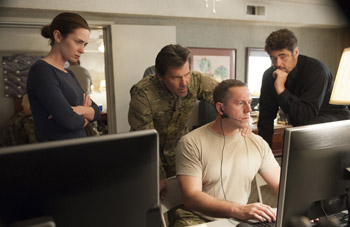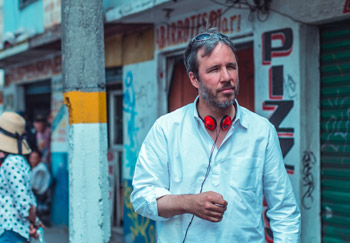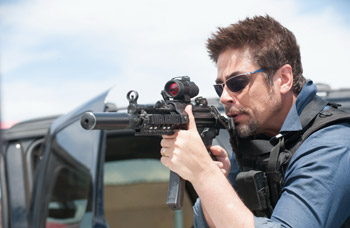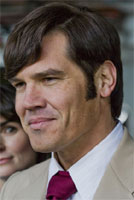Emily Blunt Sicario

Emily Blunt Sicario
Cast: Emily Blunt, Josh Brolin, Benicio Del Toro
Director: Denis Villeneuve
Genre: Crime, Drama, Mystery
Rated: MA
Running Time: 121 minutes
Synopsis: In Mexico, Sicario means hitman.
In the lawless border area stretching between the U.S. and Mexico, an idealistic FBI agent [Emily Blunt] is enlisted by an elite government task force official [Josh Brolin] to aid in the escalating war against drugs.
Led by an enigmatic consultant with a questionable past [Benicio Del Toro], the team sets out on a clandestine journey forcing Kate to question everything that she believes in order to survive.
Review: Sicario is un-reviewable for the sheer fact it's like nothing I've ever seen before. Intriguingly different and filled with anxiety-inducing suspense Sicario is unforgettable and not just because of the brutality; it is thought provoking and captivating unlike any other drug-mule film. Although the opening scenes will find you struggling to keep your popcorn down, I thoroughly recommend Sicario for adult audiences.
- Brooke Hunter
Sicario
Release Date: October 1st, 2015
About the Production
A Borderland Thriller
'You will not survive here. You are not a wolf. This is the land of wolves now." "Alejandro
From director Denis Villeneuve (Prisoners, Incendies) comes a searing emotional-thriller that descends into the intrigue, corruption and moral mayhem of the borderland drug wars.
When Arizona FBI agent and kidnap-response-team leader Kate Macer (Golden Globe® winner Emily Blunt) uncovers a Mexican cartel's house of death, her shocking find leads to profound consequences on both a personal and global level. Kate is recruited to join a covert black-ops mission headed by a mysterious Colombian operative known only as Alejandro (Academy Award® winner Benicio Del Toro, Best Supporting Actor, Traffic, 2000) along with special agent Matt Graver (Academy Award® nominee Josh Brolin, Best Supporting Actor, Milk, 2008). Even as Kate tries to convince herself she's on a hunt for justice, she is thrust into the dark heart of a secret battleground that has swept up ruthless cartels, kill-crazy assassins, clandestine American spies and thousands of innocents.
The jagged line of the U.S. and Mexican border is now awash in some of the most pressing questions of our times – drugs, terror, illegal immigration, corruption and an escalating swath of dark crime that has left people on both sides frightened and vigilant. Sicario explores the journey of an intelligence operation that pushes the rules to engage with those who don't play by any.
Says director Denis Villeneuve, 'Sicario takes a powerful look at black-ops operations and the Mexican cartels. But this story is also about America, about the idealism and realism that clash when it comes to dealing with the problems of other countries."
'It's a movie about choices," adds Benicio Del Toro, who dives into one of his most conflicted roles as the equal parts vengeful and tender hit man Alejandro. 'It's tough to say whether any character in Sicario is truly good or bad. Do the means justify the ends? What happens when go into a situation where you want to kill one guy and you kill 20 innocent people? You got the bad guy, but at what cost?"
'Kate is tempted by this world," says Emily Blunt, who breaks the mould with her portrait of a fierce female character whose life is in jeopardy throughout every second of the film. 'She realizes she was barely scratching the surface doing things by the book and now she wants to believe she can do something that will make a real difference. Yet the very idea of no longer following the rules turns Kate's whole world upside down. Nothing makes sense anymore."
Josh Brolin, who is known for characters who ply the edges, was intrigued by the movie's subtext of big questions about values versus security and whether fighting criminals with outlaw behavior darkens hearts beyond repair. 'This movie is a human mystery that you get to grab at and put together for yourself," Josh Brolin says. 'It's a suspenseful and emotional puzzle."
Building The Story
For screenwriter Taylor Sheridan, a native Texan who grew up traveling south of the border when it was still common to do so, delving into this reality was a personal lure. Taylor Sheridan is best known as an actor, specifically for playing Deputy Chief David Hale on 'Sons of Anarchy." With the probing heart of a writer, he felt called to return to his roots to explore what had become forbidden zones over the last decade. He saw that the alluring cross-cultural border of his youth had disappeared.
'I realised that Mexico doesn't exist anymore, the Mexico someone could just drive down into is gone. It's become this lawless place," says Taylor Sheridan. 'At the same time, I realised I hadn't seen any movies about how life in northern Mexico has changed, how it has become dominated by drugs and corruption, how the cartels have become militarized and how the machine of the American government has been dealing with these problems that are spilling over the border."
 The more he looked, the more Taylor Sheridan saw how much massive profits have trumped human decency, leading to a pressure-cooker atmosphere with disadvantageous impacts. The drug trade has metastasized into a major business – so large that while the flow has at times been momentarily slowed, it has never been in danger of being fully staunched.
The more he looked, the more Taylor Sheridan saw how much massive profits have trumped human decency, leading to a pressure-cooker atmosphere with disadvantageous impacts. The drug trade has metastasized into a major business – so large that while the flow has at times been momentarily slowed, it has never been in danger of being fully staunched.
As Taylor Sheridan started to explore how this state of affairs came to pass, he realized it was like trying to crack open a hornet's nest. He was walking into a world of classified CIA spy programs, secret DEA deals, cartels who murder journalists researching their operations, and of 'houses of death" – residential homes where no families live, but where cartel enemies are routinely stuffed in the walls. It was not your ordinary feature film research.
Sheridan started by poking around sun-seared, dusty border towns in the cactus-splattered Chihuahua Desert. At first he got a lot of radio silence. 'I went all along the border. There is no interviewing cartel members, no interviewing government officials. The only way in was to gain the trust of the people who are most affected by it – the migrants who, out of need, cross this border and populate the no man's land that lies between southern Arizona, New Mexico and northern Mexico," Taylor Sheridan relays. 'They were my resources."
Slowly, a story began to emerge about a side of the war on drugs few ever have seen in the U.S. -- the story of a war on drugs that often, in practical terms, becomes a war for drugs, as the powers that be jockey for control of the trade. It was, by necessity, a story full of human ambiguity.
'Crime stories are usually told either from the point of view of the hero or the villain," Taylor Sheridan notes. 'This story couldn't be like that. This is a story in which, even when you think the villain has been caught, you realize the problem hasn't really been resolved. There will be another villain tomorrow."
Taylor Sheridan was also interested in telling a personal story – a story of how a decent, justice-seeking person is irrevocably haunted by the revelations she finds on the border – and thus was born an unlikely character to take audiences into the looking-glass world of Ciudad Juarez: Kate Macer.
A steely, serious-minded tomboy, she is a woman who has always put her job and country first, who surrounds herself with a kind of shield of aloneness, yet who finds herself more and more emotionally vulnerable as she falls down the hole of the drug war. Tough as she is, devoted as she is, nothing could prepare her for this world where good and evil are turned inside out, where American agents operate with the same merciless mindset as the cartels, and where doing the right thing, the humane thing, is exactly what will bring hit men down upon you.
Kate has an intensely mixed reaction to her new black-ops colleague, the enigmatic Colombian Alejandro. She is spooked by his own blood-soaked history, intrigued by his moments of compassion and heroism, yet staggered by his ability to go from caring to remorseless on a dime.
'I though of Alejandro as being almost Shakespearean," comments Taylor Sheridan. 'He expresses himself in soliloquies that are perceptive comments about the world we live in, and they hit something in Kate. But he is also caught up in the world he describes."
The third member of Sheridan's tensely-aligned trio is the alleged Department of Defense operative Matt, who has a gift for justifying everything with an 'any means necessary" philosophy. 'I think Matt honestly believes that if it was required that you kill virtually everyone on the planet that wasn't American to protect America, that's what you should do. It's `us or them' to him. Does that make him evil? Depends on your perspective," Taylor Sheridan reflects.
Taylor Sheridan's script immediately garnered praise for its blend of a breathless thriller pace with the poignant characters of a sophisticated drama. But at first, he encountered resistance to the obvious risks of making the film. Then he met Thunder Road founder Basil Iwanyk and senior vice president of features Erica Lee.
Basil Iwanyk says the screenplay was just too powerful to ignore; it was tense and timely, it was mesmerizing in its emotional sweep. 'We thought it was one of the most beautifully, intensely, emotionally written thrillers that we've read in a really long time," he comments.
The question that loomed now was how to find a director with the fearlessness, not to mention the gripping visual style, to really go after this story's sharpest edges? Says Basil Iwanyk: 'We needed someone able to portray both the dark and the light, who is good with complex emotions but also with big action and scope, because when the bullets fly in this story, they really fly. That person was Denis Villeneuve."
Denis Villeneuve Heads South
'There is only dark, my friend." -Alejandro
Denis Villeneuve has long mined the territory where intense action, moral questions and human need entwine. He has drawn acclaim for his thematically provocative but entertaining visual storytelling in such features as Prisoners – starring Hugh Jackman and Jake Gyllenhaal in the story of a father desperate to find his kidnapped child – and Incendies – the Academy Award® nominated epic about a pair of Middle Eastern twins unravelling the dark mystery of their past. Next, Villeneuve will tackle one of the most daunting challenges in Hollywood: the long-awaited sequel to Blade Runner.
There was no doubt he was a match to take on the full spectrum of Sicario – its emotional tension, high-intensity action and ethical complexity. 'Denis has an elegant, intimate touch that only heightens action," says producer Basil Iwanyk. 'He also has an incredible ability to portray darkness in his characters' souls – even the darkness in decent men's and women's souls."
Villeneuve felt an instant affinity for the material, but his aim was to leave judgment out of it, allowing the audience to decide whether the methods used by the blacks-op team are worth it in the end. 'I have always thought that the world is gray, not black-and-white, and that the notion of good and evil is oriented by one's cultural and geopolitical background," the director comments. 'Is there a solution to the continuing growth of the drug trade? Sicario raises a lot of questions, but it leaves the answers open."
In northern Mexico, the notion of good and evil has been blurred as much as anywhere in the world – and perhaps no one, not even a righteous person such as Kate Macer, can get out without it denting her soul. Villeneuve notes that fighting terror with terror can change people and societies.
'Sicario is partly about a phantasm: the old idea that North America will be able to solve the most violent problems of the world in a very efficient and invisible way. That was once a comforting thought – but the world seems to have become more and more complicated." says the director.
He goes on: 'We have a need for super heroes. However, in today's reality, heroes don't usually have clean hands. Heroes are in contact with the most difficult moral choices, the choices we must make when confronted by evil. Sicario's moral choices fascinate me. How far should we go to stop the cartels? Can we stop the cartels without becoming like them?"
With Villeneuve on board, a strong producing team began to form along with Basil Iwanyk. Edward L. McDonnell, who also produced Prisoners, was especially thrilled to join because he had long been interested in doing a film set amid the current drug wars, but hadn't found a strong enough story. Basil Iwanyk approached Black Label Media (BLM) founders Molly Smith, Thad Luckinbill, and Trent Luckinbill to partner as producers and become the movie's financiers. They saw the story as bringing something new to the classic conspiracy thriller.
Points out Molly Smith, 'It breaks the rules and at the same time, Kate is such a relatable character. She brings us into everything that she is experiencing: not knowing who to trust, not knowing where to go next, not knowing what the right decisions are in a situation that defies rationality."
'It's topical and very current," notes Thad Luckinbill. Trent Luckinbill adds, Sicario looks at the increasingly relevant question of how you deal with monsters. Should you fight monsters with monsters to achieve a goal? Or is the rule of law more important?"
Alejandro: Ally Or Assassin?
'Nothing will make sense to your American ears, and you will doubt everything we do. But in the end you will say, -Those guys were right.'"– Alejandro
The complex heart of Sicario is the film's most unsettling character: Alejandro, who is at once a former courageous prosecutor grieving for his murdered family, Kate's sympathetic guardian and a sicario in his own right, willing to cross any line to bring down the cartels who tore apart his life. Screenwriter Sheridan imagined Benicio Del Toro taking the role even as he was writing. Fittingly, the charismatic Puerto Rican-born actor previously had won an Oscar for his indelible portrait of a different side of the drug war as a street-smart Tijuana policeman in Steven Soderbergh's Traffic. He garnered another nomination as a born-again ex-con in Alejandro Gonzalez Inárritu's 21 Grams, and has given a range of memorable performances, from joining the pulp universe of Sin City to playing Che Guevara to his recent turn as a 1960s lawyer in Paul Thomas Anderson's Inherent Vice.
Benicio Del Toro says that complexity gripped him. The question that hit him hardest was whether Alejandro can truly live with the things he has done, or if he has accepted that the price he must pay is forever being an outsider to society.
'Alejandro used to be a prosecutor, and then his family was killed in the drug wars, so from those events, he became an assassin of drug lords of sorts. But is he a bad guy? I don't know," muses the actor. 'I wouldn't say he made bad choices to get where he is, circumstances controlled by other human beings forced him to be who he is. He has been given this role of hit man for the US government, so he lives in this bloody, dark world. He is willing to do it for his own reasons, but can he ever go back into society after what he has become?"
Adds Basil Iwanyk: 'Benicio Del Toro is one of those classic actors who tells you, `Give me fewer lines. I want to play this in my eyes. I want to play this in how I nod my head or how I look away.' At times, his portrait of Alejandro is very quiet and internal but then he'll suddenly be powerful and magnetic. He's really the heart and soul of this movie."
Alejandro's impenetrable exterior only seems to soften in the presence of Kate. The two are drawn together, if just for a fleeting moment, then wrenched apart in the course of the story.
'In a strange, subtle way, Kate starts falling for Alejandro and he starts falling for her. It is very carefully played by both actors," says Basil Iwanyk. 'As Kate discovers how broken this man is, and how that is manifested in more violence than she can fathom, our heart is broken for him and for ourselves, because we were invested in this man. In Benicio Del Toro's performance, you realize Alejandro was once a good person, but because his heart was shattered he went to this dark place, and he may never recover."
Kate Macer: Looking For The Line
'Don't put me in a situation where I have to break the law to stay alive again. Understand me?" " Kate
Kate Macer's journey over the border finds her crossing the line in more ways than one. A stickler for order and a workaholic who prides herself on running a tight, by-the-book operation, suddenly she is exposed to a world where operatives take on an anything-goes mentality. The deeper she descends into Mexico, the more she begins to feel she is losing all the moral bearings that drive her. The more she tries to take charge of the situation, the more she realises she is losing control.
As with Alejandro, casting the role was crucial. The filmmakers sought someone who could tackle major FBI action and who could evince tremendous strength yet was also willing to go to the brink of heartbreak. 'We needed an actress who could authentically portray an FBI agent yet would also be a very relatable person," comments director Villeneuve. 'It's a very tough part because as the witness of this operation, Kate's beliefs are slowly disintegrating. It's a profound journey she goes on."
 Producer Edward McDonnell adds, 'We had to find a blend of physicality, intellect and emotion. We wanted somebody who intellectually could understand the process she was going through, but emotionally was torn by what was she was seeing and doing. We also needed somebody who physically could go into this world and hold her ground with the guys on the team."
Producer Edward McDonnell adds, 'We had to find a blend of physicality, intellect and emotion. We wanted somebody who intellectually could understand the process she was going through, but emotionally was torn by what was she was seeing and doing. We also needed somebody who physically could go into this world and hold her ground with the guys on the team."
Those qualities were wrapped up in Emily Blunt, the Golden Globe®-winning English actress who continually welcomes a wide range of roles. Recently, she played a Special Forces warrior battling with Tom Cruise in the sci-fi thriller Edge of Tomorrow, while she has garnered acclaim in the musical Into The Woods, the period-drama The Young Victoria, and also explored a comedic role in the cutthroat fashion world in The Devil Wears Prada, standing up to an imperious Meryl Streep.
'Kate is really the moral compass of Sicario," notes Emily Blunt. 'I was intrigued by her need to always do things in the right way, by the law. When she gets thrown into this incoherent world of CIA ops and cartels, it is completely alien to her. Whereas she's always been held accountable for every bullet she fires, they spray bullets. All the accountability that has been her way of being is gone from this world, and she is in shock at the whole thing."
An independent person by nature, and recently divorced, Kate is also deeply alone in this world. Outside of her FBI partner, who hasn't seen what she has seen in Juarez, she has nowhere to turn to keep her bearings. When she hits rock bottom, it seems for a moment that Alejandro is the only person there for her, even saving her life. But their connection is not an easy one.
Blunt was intrigued by Kate's tricky relationship with Alejandro: 'He is this rather mystical character and he doesn't say much. She has her eye on him, and she doesn't necessarily trust him. At the same time, I think he sees in Kate something that he's lost in himself," surmises Emily Blunt. 'They have this rather strange, almost magnetic link that they never fully get to explore under these extreme circumstances. They're drawn to each other in an unspoken way."
Denis Villeneuve loved watching the chemistry between Emily Blunt and Benicio Del Toro come to a simmer. 'This strange yet alluring relationship emerged from the two of them right in front of the camera and that was very important for the movie," he says. 'The way Kate tries to understand this man in a human way, brings out a beautiful, poetic angle within the violence."
Matt Graver: True Believer
'You volunteered to get on this train because you KNOW you're not stopping anything in Phoenix. You're just sweeping up the mess." " Matt
The next crucial casting task was finding the operative who brings Kate into the black-ops mission for his own reasons: easygoing but secretive Matt Graver. It was another role that demanded an actor with conviction and bravado – but one also willing to head into total moral murkiness. Certainly few actors have shown such dexterity operating at the edges as Academy Award® nominee Josh Brolin.
His roles have compelled audiences into unexpected places in such films No Country For Old Men, W. (as President George W. Bush), Milk, Wall Street: Money Never Sleeps, True Grit and Inherent Vice.
When he received the script, Josh Brolin had just come off making the movie Everest, in which he plays the Mt. Everest expedition survivor Beck Weathers, and it sucked him in immediately. Josh Brolin was intrigued by Matt Graver as a pragmatic problem solver who has made the personal choice to leave conscience out of the equation.
'I had just done this very intense movie, and I had it in my blood to want to keep going further into intensity," says Josh Brolin of why he instantly responded to Sicario. 'Matt is also such an interesting guy. He's someone who has a job to do and he believes in the validity of it. There may be costs to it, but he believes that he could save millions of people from addiction and crime if he succeeds."
Josh Brolin had worked with Benicio Del Toro several times previously, and was equally lured by the chance to collaborate this time as yin-and-yang sides of the same coin. 'What I found really interesting is the familiarity between Alejandro and Matt," Josh Brolin observes. 'They're total opposites, yet they're in the same business, so they're helping each other out. Alejandro is totally laconic but my character can't stop talking, which makes perfect sense. It's that kind of opposition that makes it fun."
As for Matt's gift for gab, Josh Brolin notes: 'He talks a lot, but you never know if Matt is telling the truth, whether he's manipulating people, or whether he's using humour as a passive aggressive tool."
The filmmakers were mesmerised by the way Josh Brolin inhabited the slippery interior of this character. 'Josh Brolin is electric on camera. He brings an energy that's real," says Molly Smith. Adds Basil Iwanyk, 'Josh Brolin is the quintessential swaggering American tough guy. He has great wit and a strong physicality. He is someone who, no matter how dark his behaviour, you still love to watch him."
On The Border: Shooting In New Mexico, Texas And Mexico
'Juarez is what happens when they f***ing dig in!""Matt
Juarez, Mexico lies just across the Rio Grande from El Paso, Texas. But for many who live there, it is a world away. The once booming border town became known as 'the murder capitol of the world," many living in fear and often in extreme poverty. The city was lined with the remnants of foreign-owned maquiladora factories that spoke to an era of global trade that abandoned Northern Mexico. At one point so many people disappeared daily … and so many dead bodies appeared suddenly out of nowhere … that such events no longer made headlines.
Though Juarez's murder rate has dropped since 2012, the city remains one of the riskiest on earth for journalists and probing outsiders, and new cartels are on the rise. So how was a major motion picture going to penetrate the treacherous realities of this world? It was not easy. Even the location scout was more like a military mission.
Remembers producer Basil Iwanyk, 'When we decided to go to Juarez, we couldn't find one American law enforcement agency to give us the official go-ahead to go across the border. We went with a Mexican -fixer' who had successfully brought a CNN crew into Juarez a few years ago, and he contacted a bunch of undercover federales who drove us around. They carried submachine guns in the front of the car and told us very specific things like, I should bring glasses with me, since I wore contact lenses, just in case we got stopped and kidnapped. We drove a white SUV because only the cartel guys drive black SUVs and if you drive a black SUV you can get targeted."
During six intense hours, the scouting group was only allowed out of the vehicle twice. Basil Iwanyk recalls, 'We were shadowed by a white Mustang because we were there too long, but the trip made the movie for us. We understood what Juarez was. It really coagulated Denis's vision. The thing that strikes you about Juarez is that life goes on - there are kids playing ball there, there are people going on with their daily business - but at the same time there's this overhanging veil of darkness and crime."
Everyone who went to Juarez was hit hard. Recollects producer Edward McDonnell: 'I remember asking the federales, `What's the good part of town?' They said, -the good part of town is where they're not killing anyone, and the bad part is where they are killing somebody.' There really is no safe part of Juarez. That's not something you see on the news. You might see figures of how many people died in Juarez, but you don't see the people's lives behind it."
While the production did not shoot in Juarez, most of the filming took place in Albuquerque, New Mexico; El Paso, Texas; and Veracruz, Mexico. Villeneuve became fascinated with the borderland terrain, setting out to capture the harsh, bone-dry, yet lyrical essence of the badlands – a landscape that seems to mirror what Kate is going through. He brought in a group of trusted collaborators to bring the visuals to life, including 11-time Academy Award® nominated cinematographer Roger Deakins, Oscar® nominated production designer Patrice Vermette and costume designer Renée April, whose works spans from the realism of Prisoners to the wild fantasy of Rise of The Planet of the Apes.
'Sicario's colors and textures are directly inspired by the Chihuahuan Desert," says Denis Villeneuve. 'I wanted the characters to be silhouettes crushed by the sun. We shot the movie in monsoon season, so every day thunderstorm cloud formations created astonishing skies for us. The sky became a silent character in the film, a poetic expression of Kate's inner and outer torments. The desert is a fascinating place because it can be extremely harsh and raw … and yet it can be inspiring," Villeneuve concludes. 'This is what it's like on the border – and we experienced that."
The film's glowingly bright, hyper-real look was forged in close collaboration with Roger Deakins, reuniting with Denis Villeneuve after Prisoners. They painstakingly storyboarded the film to prepare for the precise composition of Roger Deakins' shots. Both agreed that the photography should capture the unremitting action in maximum detail, but without stamping a judgment on it.
Describes Roger Deakins, 'We played with wide shots that allow the action to unfold without multiple cuts, and we used vibrant, clean colors. The overall look is one of naturalism."
The cinematographer honed in on Benicio Del Toro's Alejandro as the visual cornerstone of the film, a man who wears the story of the drug wars on his face and in his body language. 'For me the mood of Sicario comes from the characters and from Benicio Del Toro's character in particular," says Roger Deakins.
'In my mind I was thinking of something akin to Le Samourai or The Red Circle," he continues, referring to Jean Pierre Melville's atmospheric, 60s crime classics. 'Those are films which have central characters who can be cold and cruel but who you sympathize with at the same time."
Roger Deakins wove the primal elements of light and dark through the film, often utilising light in unexpected ways. 'Perhaps the most chilling scene in the film is lit using a soft, warm source light," he notes. 'That may not be the norm but I think it works as a counterpoint that defies expectations."
 Production designer Vermette – who also collaborated with Denis Villeneuve and Roger Deakins on Prisoners – aimed for a gritty authenticity in his sets. He found inspiration in the work of street photographer Alex Webb, a reference suggested by Deakins for Webb's vibrant but emotional shots capturing the paradoxes of life on the U.S.-Mexican border. Equally, Vermette was inspired by the sharp opposites of the landscape, by the drained colors of the desert and the teeming vividness of Juarez.
Production designer Vermette – who also collaborated with Denis Villeneuve and Roger Deakins on Prisoners – aimed for a gritty authenticity in his sets. He found inspiration in the work of street photographer Alex Webb, a reference suggested by Deakins for Webb's vibrant but emotional shots capturing the paradoxes of life on the U.S.-Mexican border. Equally, Vermette was inspired by the sharp opposites of the landscape, by the drained colors of the desert and the teeming vividness of Juarez.
Vermette chose a palette of beige and sand for the U.S. side, but that palette explodes into a multi-chromatic kaleidoscope over the border. 'The austere look of the U.S. military and DEA is contrasted in Mexico with an anarchy of colours and the chaos of urbanism," says Vermette.
The designer's biggest challenge was finding a way to re-create the famed Bridge of the Americas, where a major shootout takes place amid the heightened claustrophobia of 14 congested lanes of traffic. The Department of Homeland Security was not about to close down the actual bridge, so Vermette scouted alternate bridges in El Paso, then built his own facsimile. Tarmac was laid down, narrow lanes were striped and aged with oil stains and tollbooths were installed to choke up the traffic.
Another intriguing challenge was creating the mansion of Sonoran drug lord, Fausto Alarcon. Vermette used a Tuscan-style estate in the pastoral north Albuquerque suburb of Corrales, bringing in Mexican design elements and decking out the posh outdoor cabana for the climactic dinner scene. Vermette also constructed on a stage one of the least-seen elements of the drug war: the cartel tunnels that burrow beneath the border to hide the illicit flow of drugs and money. Bricks of drugs stashed in the tunnel were created out of shrink-wrapped hamster shavings. Based on law enforcement and journalistic images of real tunnels, the set was then littered with plastic bags, Tupperware, sandwich wrappers, hardhats, electrical wiring, shovels, picks, and buckets – the detritus of constant human traffic.
In her costumes, Renée April also aimed for a palpable realism. She says the research alone was harrowing. 'I watched a lot of documentaries and saw a lot of pictures that I shouldn't have seen, trying to find the truth so that people will see it and they will believe it," she says.
For Emily Blunt's Kate, Renee April kept things stark and tough – with the character often seen in a plain gray T-shirt, dark pants and combat boots, even when she's off duty. 'She works with the boys, she's out there in her sweaty uniform, and when she's not, she's still a T-shirt woman. I kept it very minimalist in keeping with her personality, no-frills," describes Renee April. 'Then she goes into darker colors towards the end as everything that is happening to her darkens."
Benicio Del Toro's Alejandro used to be an attorney, and is often clad in a Prussian-blue suit jacket, except when he dons all-black tactical gear for battle. 'That blue is not a color you see often and it has a European feeling to it. That's what I liked, that it didn't look American," says Renee April. 'This gives you a sense of who Alejandro was before his life fell apart."
The look for Josh Brolin's Matt was equally based on a character who is a study in contrasts: casual-minded enough to wear flip-flops yet hard as nails. 'I went for what the character naturally is," says Renee April. 'This is a guy who lives in hotel rooms. He never knows where he's going to be next. He buys those ugly shirts and ugly pants that you wash in the sink and they dry in five minutes. He's practical."
After production, Villeneuve closely collaborated with editor Joe Walker, who recently garnered an Oscar® nomination for Twelve Years a Slave, to carve out the film's high-anxiety rhythms. He also reunited with Prisoners composer Jóhann Jóhannsson, the Icelandic native known for his entrancing melodies and insistent percussion, who created a haunting aural backdrop for Sicario that matches the film's fierce action and lingering emotions.
Sicario
Release Date: October 1st, 2015
Have You Seen This?
MORE
- Mission: Impossible Fallout
- Glenn Close The Wife
- Allison Chhorn Stanley's Mouth Interview
- Benicio Del Toro Sicario: Day of the Soldado
- Dame Judi Dench Tea With The Dames
- Sandra Bullock Ocean's 8
- Chris Pratt Jurassic World: Fallen Kingdom
- Claudia Sangiorgi Dalimore and Michelle Grace...
- Rachel McAdams Disobedience Interview
- Sebastián Lelio and Alessandro Nivola...
- Perri Cummings Trench Interview






